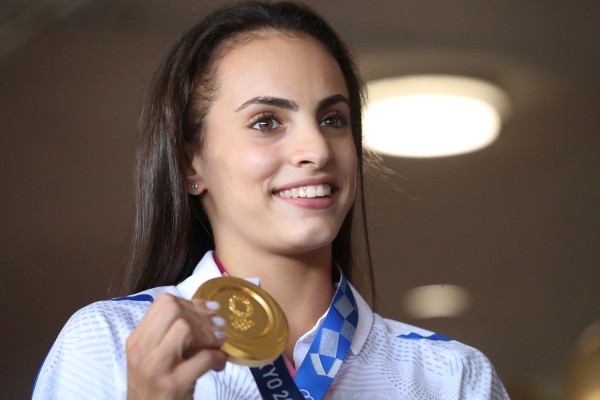In an interview with Israel Hayom, Olympic gold medalist Linoy Ashram shared her fears of disappointing her country in Tokyo and her faith in God.
By Pesach Benson, United With Israel
Back from the Tokyo Olympics and coming down from the high of a gold medal, rhythmic gymnast Linoy Ashram and trainer Ayelet Zussman opened up on God, Russian trolls and the pressures that come with competing at the highest levels of international sports in an interview with Israel Hayom.
“I’m still living the dream,” said Ashram. “Only now, slowly, I’m beginning to understand the magnitude of the achievement.
“I came to Tokyo with the goal of giving my all and experiencing the moment and the feeling of being there, at the Olympics. I knew that, if I did well, I could return with some kind of medal, but I didn’t imagine what color it would be. The idea that it would be gold didn’t enter my head.”
Asked if she believes in God, Ashram said, “Yes. I went with Ayelet to the Western Wall before we flew to Japan and I placed a note there. I light the candles on Shabbat, fast on Yom Kippur, and I recited ‘Shema Yisrael’ to myself before every routine.”
Zussman recalled one sleepless night in the Olympic village
“That night, I couldn’t sleep because of the jet lag, and I felt that Linoy was also awake. 4:30 a.m., I decided to check when she had last been seen on WhatsApp, and I saw that she was online. Twenty minutes later, I saw that she was again on WhatsApp, and I realized that she wasn’t able to sleep,” the trainer said.
“We went up on the roof of the hotel. The city was spread out before us, the morning was beginning, and we had a heart-to-heart talk, where she told me about all the pressure she was under.”
The pressure, said Zussman, was “that she was afraid to disappoint the country and me as well. I calmed her down and I said, ‘You don’t disappoint me. The path that you took, that we took, up to now, that is what’s important. Here you just have to enjoy yourself.’ I told her how much I had faith in her, in her ability, in who she is.”
During Ashram’s competition, she dropped her ribbon. What went through Ashram’s mind? How did she keep her poise?
“I was pessimistic. I felt that perhaps it would harm my final score and drop me down a bit in the rankings, but I continued because that’s who I am,” Ashram told Israel Hayom.
“I give my maximum even when something doesn’t go right and there’s a hitch. On some level, it even resets me, and that’s also what happened with the ribbon. Within a second, I succeeded in returning to myself. After the routine Ayelet said to me that my difficulty level was really high and that the mistake shouldn’t harm my score too much, and she was right.”
When the competition was over, while waiting for the results, Ashram said she sought out her Russian rival, Dina Averina. But she was crying as she approached Averina and “was in no state to talk. Since then, there wasn’t an opportunity to talk or to get in touch at all. At competitions we say hello and wish good luck to one another, and after the competition we congratulate one another at the end.”
Ashram faced a lot of Russian trolling on social media, where critics said she didn’t deserve to win, that the judges were biased against Russia, and some of the comments devolved into anti-Semitism. But Ashram told Israel Hayom she didn’t let the abuse mar the joy of her achievement.
“I don’t deal with what others are saying. I made my achievement, and it’s mine together with Ayelet and the professional team. Whoever wants, they can say what they want, I’m happy with what I achieved.
“In the World Championships in 2018, Dina’s ribbon fell, and she still beat me. We didn’t say a word. That’s the judging, and that’s the Olympics. That is, the fairest judging there is. I also heard already that Dina said it’s not my fault.”
“I don’t know why it has to reach the level of anti-Semitism. There are people who think one way and there are people who think another way.”
Ashram also said her nickname, Black Panther, isn’t based on racism. The nickname, she said came at competition when she was 14. An Azerbaijani sportsman called her the Black Panther “because everyone apart from me was white and Russian.”
The nickname, Ashram added, doesn’t bother her, but rather helps her embrace her roots.
“I love the color of my skin. I’m proud of my origins… My father has roots in Yemen and my mother is of Greek origin, and both of them were born in Israel.”
